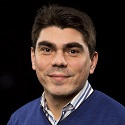 Featuring …
Featuring …
Erkut Kucukboyaci, PhD
Post-Doctoral Fellow, Kessler Foundation
Co-Chair, ACRM International Networking Group Refugee Task Force
What is your current research focus or area you are most excited about?
I focus on cognitive rehabilitation and I enjoy exploring the optimal use of neuropsychological assessments and neuroimaging to guide prognosis and treatment options for diverse populations who may face barriers to care. Right this moment, I am working on a project funded by the New Jersey Health Foundation that assesses the efficacy of clinician-assisted computerized memory interventions for patients with TBI where we rely on the software more for the practice of strategies learned via one-on-one sessions with clinicians.
What prompted/motivated you to choose that area?
Healthcare costs in the U.S. have always outraged me. During my training in clinical neuropsychology, I would routinely encounter situations in which individuals would not be able to access care for financial and transportation-related reasons. Within the field of rehabilitation, where the recovery is more like a marathon than a sprint, such access barriers become strong determinants of the longer-term recovery of patients. Technology provides increasingly democratic, low-cost solutions that can be tailored to patients’ needs. As a clinical researcher, I believe it is my responsibility to explore these solutions and explore the circumstances under which these novel interventions yield optimal results, so that we can offer lower-cost solutions to patients one day. Some of my peers fear that the technology will undermine their utility as neuropsychologists. Working as an interventionist-neuropsychologist makes it easier to look past these fears.
Briefly, what path did you take to get there? Or what is your career trajectory- long-term goal?
My path has been quite unique and my journey is far from complete. After studying Economics and French at Harvard, I worked as a management consultant for about four years. As I worked for a company with a quantitative focus, I learned a lot about data-driven decision making and business strategy. My path changed significantly after I experienced a spinal cord bleed in 2005 that put me 6+ months of rehabilitation for cauda equina syndrome. As I relearned how to walk, my first hand observations of the meaningfulness of the impact one can have in rehabilitation setting convinced me to gradually shift my focus. I completed my masters in Psychology at NYU and my Ph.D. in Clinical Psychology at the SDSU/UCSD Joint Doctoral Program. I was ecstatic during my first day of internship at Rusk Rehabilitation, when I finally made my way back to rehabilitation a decade later. I joined the Kessler Foundation in 2017 to focus more on clinical research and to train further in cognitive rehabilitation with Drs. Chiaravalloti and DeLuca. I am currently working on grants and projects that offer various novel cognitive rehabilitation options to patients with TBI, MS and epilepsy while also increasing my advocacy efforts for diversity issues.
What barriers or facilitators did you encounter along the way? If a barrier, how did you overcome that barrier.
I’ve always believed that the diversity of backgrounds and perspectives can boost group performance in any setting. Clinical psychology, though it is trying to align itself as a STEM field, is not as diverse as many STEM fields. In most clinical settings, there is a scarcity of psychologists from minority backgrounds, which makes it difficult for early career folks to find role models for academic success. This is not surprising since scholars with Middle Eastern heritage are also not eligible to apply for diversity supplements on most government grants due to strict race-based definitions used. Meanwhile, the patient populations seeking mental health and rehabilitation services are incredibly diverse, and it is important to meet their demand by making our training pipeline more inclusive. There are a few structural barriers that stand in the way for this. First, graduate education is a privilege. I am privileged to be able to postpone my “salary-bearing” years by a decade to obtain years of clinical training. The cost of graduate education, compounded by low RA/TA salaries make it very difficult to attract meritorious individuals who are financially independent and represent diverse backgrounds. I wish senior academics in university settings would address the increasing financial burden of graduate education more openly and strive to improve salaries to attract a more diverse group of trainees that represent different linguistic, ethnic, cultural backgrounds. Shifts in the current academic model that relies heavily on doctoral and post-doctoral trainees could easily be aligned with our longer term goals to be more inclusive.
Advice for young scientists. Words of wisdom.
Working in rehabilitation is incredibly rewarding in terms of teamwork. I have worked alongside impressive allied health professionals during my clinical training and have seen the amazing impact a psychology-minded PT, OT, SLP, dietitian and SW can make in team settings. For this reason, when I get a chance to mentor junior researchers who are interested in our field, I try to inform them about the various clinical subspecialties within rehabilitation so that they can make informed decisions about their graduate careers. I also try to use my corporate experience to help them think about research outside of academia.










